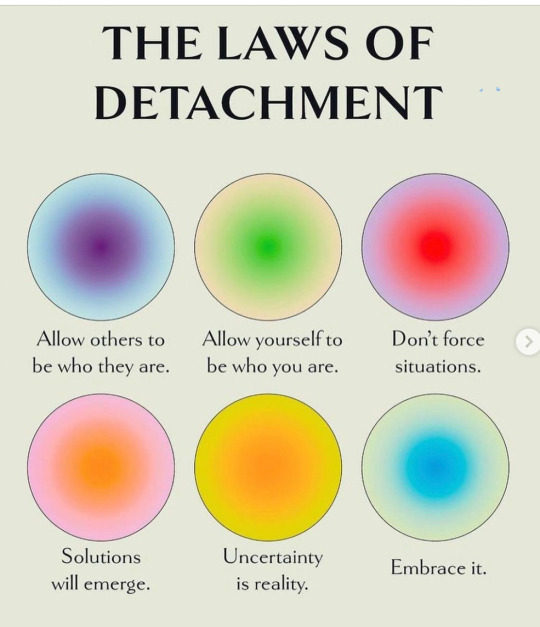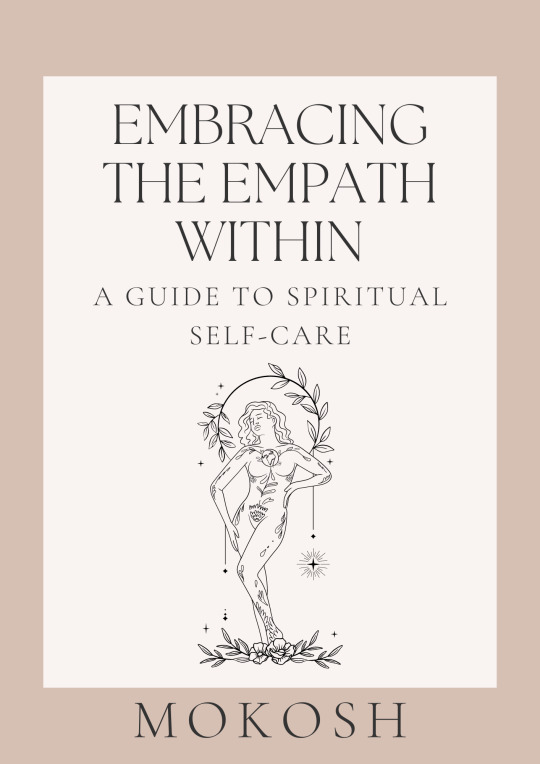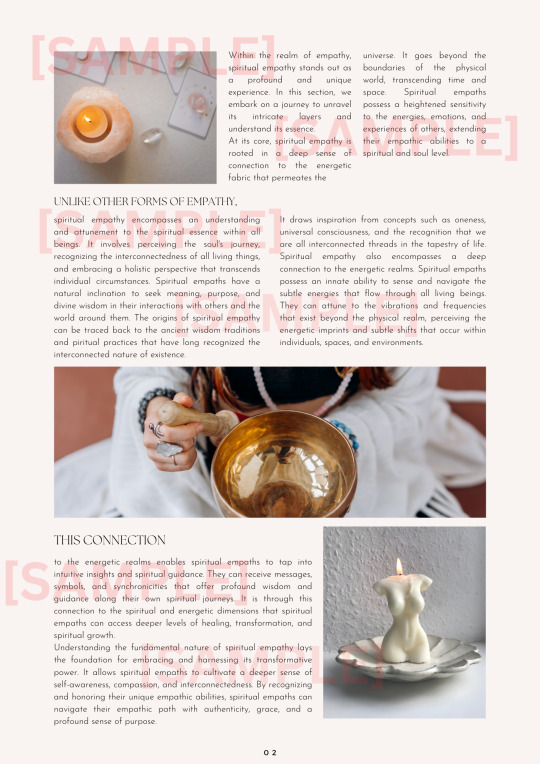#emotionalwellbeing
Text

#healing#journey#growth#progress#patience#self-compassion#innerstrength#resilience#emotionalwellbeing
10K notes
·
View notes
Text

The Laws of Detachment promote personal growth, better relationships, and emotional well-being. 💆♀️ They encourage us to let go of control, embrace uncertainty, and accept ourselves and others. 💛 By allowing others to be who they are, we create space for healthier relationships. 🤝 We should also embrace our own individuality without seeking validation from society. 🌟 Trusting that solutions will emerge and accepting uncertainty as part of life can help us become more resilient in the face of adversity. 🙌
181 notes
·
View notes
Photo

(via learn to pause. 🌜 | Mla, Legging || Curated with love by yogadaily)
#selfobservation#svadhyaya#innerhealing#emotionalwellbeing#wellbeingquotes#innerwork#livewithintention#respond#musingsbymadeleine#mla#musings#madeleineluisearena#writersoninstagram#writersden#yogapracticedaily#yoginis#yogaphotography#yogaasana#ardhachandrachapasana#yoga#yogi#yogini#yogainspiration#inspiration#inspire#inspirational#motivation#yogamotivation#yogaposes#yogapose
27 notes
·
View notes
Text
🌟 Exciting Announcement! 🌟
Hey, beautiful souls! I'm thrilled to share that my new book, "Embracing the Empath Within: A Guide to Spiritual Self-Care," is now available for you to embark on an incredible adventure of self-discovery and empowerment. ✨
Are you ready to embrace your empathic nature and harness its powerful gifts? This book is a heartfelt guide crafted with love, wisdom, and personal experiences to support you on your empathic journey. Whether you're just beginning to explore your empathic abilities or seeking to deepen your understanding, this book is for you!
Inside these pages, you'll discover:
🌸 Insights into the empathic experience
🌸 Practical techniques for grounding and self-care
🌸 Guidance on setting boundaries and nurturing relationships
🌸 Tools for emotional healing and resilience
🌸 Strategies to amplify your intuition and inner wisdom
🌸 Rituals and practices to create sacred spaces
This book is a gentle companion that will inspire and uplift you, providing practical advice, meaningful exercises, and heartfelt encouragement along the way. It's time to celebrate your empathic nature and embrace the beautiful soul that you are. 💖
🔮 Grab your digital copy today and unlock a world of self-discovery: Embracing the Empath Within: A Guide to Spiritual Self-Care
Remember, you are not alone on this journey. Together, let's create a community of empathic souls who uplift and support one another. Share this post with your fellow empaths, and let's embark on this transformative journey together!
With love and light, Mokosh✨




#empath#empathicjourney#selfdiscovery#sensitivity#emotionalwellbeing#selfcare#intuition#empathicgifts#spiritualjourney#selfempowerment#mindfulness#selflove#magic#spirit witch#litha#wheel of the year#spiritualgrowth#empathicwisdom#emotionalhealing#empathiccommunity#soulfuljourney#empathicliving#sensitivityandgrace#empathicguidance#empathichealing#intuitivejourney#soulfulconnections#empoweredempath#empathicguide#selfcareforthesoul
16 notes
·
View notes
Text
Harmonizing Health: Exploring the Power of Sound Healing Through the Human Voice
Shaina Tranquilino
April 16, 2024

In our modern world, with its bustling cities and constant technological noise, it's easy to overlook the profound impact that sound can have on our health and well-being. Yet, for centuries, cultures around the globe have recognized the therapeutic potential of sound, harnessing its power to promote healing and restore balance in mind, body, and spirit. Among the diverse array of sound healing modalities, one stands out as both ancient and deeply personal: the healing power of the human voice.
The concept of sound healing through the human voice is rooted in the understanding that every sound carries a unique vibrational frequency, and these vibrations can influence the energetic systems of the body. Just as a skilled musician can tune an instrument to produce harmonious melodies, practitioners of vocal sound healing use their voices to create specific tones and frequencies designed to resonate with the body's natural rhythms and promote healing.
At the heart of vocal sound healing lies the belief that the human voice is a powerful instrument for transformation and self-expression. Whether through chanting, toning, humming, or singing, individuals can tap into the innate resonance of their own voices to create a therapeutic experience that transcends words alone. By vocalizing specific sounds and syllables, practitioners can stimulate the body's energy centers, known as chakras, and facilitate the flow of vital life force energy, or qi.
One of the most widely recognized forms of vocal sound healing is chanting, which has been practiced for centuries in various spiritual traditions, including Hinduism, Buddhism, and Christianity. Chanting involves the repetition of sacred words or phrases, known as mantras, often accompanied by rhythmic breathing patterns. This rhythmic chanting can induce a meditative state, quieting the mind and allowing practitioners to connect with their inner selves on a deeper level.
Similarly, toning involves sustained vocal sounds, such as "ah," "oh," or "mm," produced with a focus on resonance and vibration. By experimenting with different pitches and timbres, individuals can explore the subtle nuances of their own vocal expressions and discover the healing potential within their voices. Toning can be practiced both individually and in group settings, fostering a sense of community and shared intentionality.
Humming, another simple yet potent form of vocal sound healing, involves the sustained production of a low-frequency sound, typically with the lips closed. This gentle vibration can have a calming effect on the nervous system, reducing stress and promoting relaxation. In addition to its therapeutic benefits, humming has also been shown to improve respiratory function and support overall vocal health.
Singing, perhaps the most intuitive form of vocal expression, offers a dynamic outlet for creative self-expression and emotional release. Whether belting out a favorite song in the shower or participating in a community choir, singing engages the body, mind, and spirit in a harmonious union of sound and sensation. Research has shown that singing can enhance mood, boost immune function, and even alleviate symptoms of depression and anxiety.
While the scientific evidence supporting the efficacy of sound healing through the human voice is still emerging, countless individuals have experienced profound transformations through their own vocal practices. Whether as a complement to traditional medicine or as a standalone therapeutic modality, vocal sound healing offers a holistic approach to health and wellness that honors the innate wisdom of the body.
The human voice is a powerful tool for healing and transformation, offering a direct pathway to the deepest recesses of our being. By harnessing the vibrational frequencies of sound, we can tap into the inherent wisdom of the body and unlock the potential for profound healing and self-discovery. Whether through chanting, toning, humming, or singing, the practice of vocal sound healing invites us to listen deeply, speak authentically, and harmonize with the rhythms of life itself.
#SoundHealing#VocalTherapy#HolisticHealth#MindBodySpirit#Chanting#Toning#Humming#Singing#WellnessJourney#NaturalHealing#SelfExpression#InnerHarmony#EnergyHealing#ChakraAlignment#VibrationalMedicine#HealingSounds#MentalHealth#EmotionalWellbeing#AncientWisdom#SpiritualPractice#Resonance#SoundVibration#SelfDiscovery#Mindfulness#CommunityHealing#QiFlow#HealthyLiving#HarmonizingHealth#Healing with the Voice#Voice
3 notes
·
View notes
Text
Celestial Insights: Nurturing Creativity and Empathy under the Virgo Moon
Article by Shianna S.
Elemental Evolutions
March 26, 2024
Greetings, fellow stargazers! As the Moon continues its nurturing journey through Virgo, a day of meticulous planning and gentle introspection awaits. The cosmos whisper secrets of growth and a renewed focus on detail, so grab your favorite herbal tea and settle in for a heartfelt exploration of what the stars hold for your sign.
Pisces…

View On WordPress
#AstrologyForecast#AstrologyGuide#AstrologyInsights#AstrologyPredictions#AstrologyReading#AstrologyTips#CommunicationSkills#Creativity#DailyHoroscope#EmotionalWellBeing#Empathy#HighSearchKeywords#Horoscope#Inspiration#Introspection#Intuition#KeywordResearch.#Love#MentalHealth#MindBodySpirit#Mindfulness#Motivation#PersonalGrowth#PositiveAffirmations#PositiveThinking#Relationships#Romance#SelfCare#SelfImprovement#SelfLove
2 notes
·
View notes
Text

#Mindulness#selfhealing#selfgrowth#selfcare#eunoia#hiddenknowledge#hiddenwisdom#wisdom#personaldevelopment#boundaries#divinefeminine#perspective#emotionalwellbeing#introspection#mindfulness#selflove#emotionalawareness#balance#feminineenergy#masculinity#balancedmasculine#yinyangenergy#objectivity#empathy#emotionalintelligence#socialintelligence#independence#codependency#selftrust#travel
28 notes
·
View notes
Text
Managing Grief and Loss

Grief and loss are universal experiences that everyone goes through at some point in their lives. It's a natural response to losing someone or something that's important to us. However, the process of grieving can be incredibly challenging and often feels overwhelming. This blog post aims to help you understand grief and loss better and provide practical tips for managing these difficult emotions.
Understanding Grief and Loss
Definition of Grief and Loss
Grief is a natural response to loss. It's the emotional suffering you feel when something or someone you love is taken away. Loss, on the other hand, doesn't only refer to the death of a loved one. It can also include the end of a relationship, loss of health, losing a job, loss of financial stability, a miscarriage, retirement, death of a pet, loss of a cherished dream, a loved one's serious illness, and so on.
The Different Types of Loss
Loss can be categorized into two main types: tangible and intangible. Tangible losses are those that are physical in nature, such as the death of a loved one or loss of a job. Intangible losses are those that are not physical, such as the loss of security or dreams.
The Stages of Grief
According to the Kübler-Ross model, there are five stages of grief: denial, anger, bargaining, depression, and acceptance. However, it's important to remember that not everyone goes through all these stages or in the same order. Grief is a highly individual process and varies from person to person.

Photo by RDNE Stock project on Pexels
Coping With Grief: 7 Things to Remember When Dealing with Loss
Accepting the Reality of Your Loss
Acceptance is the first step towards healing. It involves acknowledging the reality of your loss and recognizing that this new reality is the permanent reality.
Allowing Yourself to Feel the Pain
Grief is a process of healing, and it involves experiencing the pain of your loss. It's important to allow yourself to feel this pain rather than trying to suppress it. Taking care of your emotional wellbeing during this time is crucial.
Adjusting to Life Without the Deceased
Changes in routines
After a loss, your daily routines may change. This can be challenging, but it's a necessary part of the grieving process.
Changes in roles
You may also have to take on new roles that were previously filled by the person who has passed away. This can be difficult and may require time and patience.
Maintaining a Connection to the Deceased While Moving On
Remembering your loved one doesn't mean you're not moving on. You can maintain a connection with them while continuing to live your life.
Seeking Support
Professional help
Don't hesitate to seek professional help if you're struggling with your grief. Therapists and counselors can provide strategies and tools to help you cope. Holistic counseling can be particularly beneficial.
Support groups
Joining a support group can also be helpful. It allows you to connect with others who are going through the same experience.
Taking Care of Your Physical Health
It's important to take care of your physical health while you're grieving. This includes eating a healthy diet, getting regular exercise, and ensuring you get enough sleep.
Giving Yourself Time
Grief doesn't have a set timeline. It's important to give yourself time to heal and not rush the process.

Photo by RDNE Stock project on Pexels
How Family and Friends Can Support You When You Are Grieving
Understanding the Grieving Process
Family and friends can provide support by understanding the grieving process and being patient with you as you navigate your way through it.
Providing Emotional Support
They can also provide emotional support by listening to you, being there for you, and offering comfort and reassurance when needed.
Helping with Practical Matters
Helping with practical matters such as meals, household chores, or paperwork can also be very helpful.

Photo by RDNE Stock project on Pexels
Dealing with a Major Loss
Mourning A Loved One
Honoring their memory
There are many ways to honor the memory of a loved one. This could be through a memorial service, a tribute, or simply by remembering and sharing stories about them.
Dealing with feelings of guilt and regret
It's common to experience feelings of guilt and regret after a loss. It's important to remember that these feelings are a normal part of the grieving process.
Living with Grief
Managing triggers
There may be certain triggers that remind you of your loss. Learning to manage these triggers can help you cope with your grief.
Finding new meaning and purpose
After a loss, it's important to find new meaning and purpose in your life. This can help you move forward and start the healing process.

Photo by RDNE Stock project on Pexels
Helping Others Grieve
Helping Adults Grieve
Listening and validating feelings
One of the most important ways you can help someone who is grieving is by listening to them and validating their feelings.
Offering help with practical matters
Offering to help with practical matters can also be very helpful. This could include cooking meals, doing laundry, or helping with paperwork.
Helping Children Grieve
Explaining death in age-appropriate terms
When helping children grieve, it's important to explain death in terms that they can understand.
Encouraging expression of feelings
Encourage children to express their feelings about the loss. This can help them process their grief.
Maintaining routines and stability
Maintaining routines and providing stability can also help children cope with loss.

Photo by RDNE Stock project on Pexels
Looking to the Future
Finding Hope and Healing
While grief can be incredibly painful, it's important to remember that there is hope. Healing is possible, and with time and support, you can learn to live with your loss and find joy in life again.
Rebuilding Your Life
Rebuilding your life after a loss takes time and patience. It's important to take small steps and be gentle with yourself during this process.
Remembering Your Loved One in Healthy Ways
Remembering your loved one in healthy ways can help you cope with your loss. This could include creating a memory box, writing a letter to them, or planting a tree in their memory.
Remember, it's okay to grieve, and it's okay to ask for help. You're not alone in your journey. Reach out to supportive friends, family, or professionals who can provide guidance and comfort. And always remember, there is no right or wrong way to grieve. Everyone's grief journey is unique and valid.
For more resources on coping with grief and loss, consider exploring our psychoeducation on trauma and hypnotherapy for coping with grief and loss services.
#EmotionalHealing #HopeAndHealing #HealingJourney #EmotionalWellbeing #ReikiHealing
For further reading, you can refer to these resources: Coping with Grief - NIH, Coping with Grief: 7 Things to Remember When Dealing with Loss, and Grief: Coping with the loss of your loved one.
Managing Grief and Loss FAQ
What is grief?Grief is a natural response to loss. It is the emotional and psychological reaction to losing someone or something significant in your life. It can be triggered by the death of a loved one, the end of a relationship, a job loss, or any other major life change.
What are the common symptoms of grief?Common symptoms of grief include sadness, anger, guilt, shock, disbelief, and a sense of emptiness. Physical symptoms like fatigue, changes in appetite, sleep disturbances, and difficulty concentrating are also common. Grief can manifest differently for each person, and it's important to remember that there is no right or wrong way to grieve.
How long does grief last?Grief is a highly individual experience, and there is no set timeline for how long it lasts. The duration of grief can vary greatly depending on factors such as the nature of the loss, the individual's coping mechanisms, and the support they receive. It's important to allow yourself time to grieve and seek support when needed.
What are some healthy coping strategies for managing grief?Some healthy coping strategies for managing grief include talking about your feelings with a trusted friend or therapist, engaging in self-care activities like exercise and meditation, joining a support group, and expressing your emotions through creative outlets such as writing or art. It's important to find what works best for you and give yourself permission to grieve in your own way.
How can I support someone who is grieving?Supporting someone who is grieving involves being present, listening without judgment, and offering practical help. Let them know you are there for them and encourage them to express their feelings. Avoid offering unsolicited advice or trying to "fix" their grief. Each person's grief journey is unique, so be patient and understanding.
When should I seek professional help for grief?It may be beneficial to seek professional help for grief if you find that your grief is significantly interfering with your daily functioning, if you are experiencing prolonged and intense feelings of guilt or hopelessness, or if you are having thoughts of self-harm or suicide. A mental health professional can provide guidance and support during this difficult time.
Is it normal to experience waves of grief even after some time has passed?Yes, it is normal to experience waves of grief even after some time has passed. Grief is not a linear process, and it can resurface during special occasions, anniversaries, or when triggered by certain memories. These waves of grief are a natural part of the healing process, and it's important to allow yourself to feel and process these emotions as they arise.
Can grief affect physical health?Yes, grief can affect physical health. The emotional stress of grief can lead to physical symptoms such as headaches, digestive issues, weakened immune system, and sleep disturbances. It's important to take care of your physical health by maintaining a balanced diet, getting regular exercise, and seeking medical attention if needed.
Are there any support groups or resources available for managing grief?Yes, there are many support groups and resources available for managing grief. Local hospitals, community centers, and religious organizations often offer grief support groups. Online forums and websites dedicated to grief and loss can also provide valuable resources and a sense of community. Reach out to local resources or search online for grief support options in your area.
Can grief affect relationships with others?Yes, grief can affect relationships with others. The intense emotions and changes in behavior that often accompany grief can strain relationships. It's important to communicate openly with your loved ones about your needs and feelings, and to give each other space and understanding. Seeking couples or family therapy can also be helpful in navigating the challenges that grief can bring to relationships.
Read the full article
3 notes
·
View notes
Text

The Longing for Joy: When Life Feels Dull and Grey
Life can be a rollercoaster of emotions, from soaring highs to crushing lows. But what happens when the good times seem to fade away, leaving you feeling empty and unfulfilled? If it's been a while since you've experienced genuine joy, you're not alone. Many people grapple with periods of emotional numbness, wondering if they'll ever feel happiness again.
2 notes
·
View notes
Text

Explore the benefits and drawbacks of using cannabis as a means to manage emotional pain. Read on to discover key facts and considerations surrounding this topic.
Pros:
Potential mood-enhancing effects.
Relaxation and stress reduction.
Relief from symptoms of anxiety and depression.
Improved sleep quality.
Enhanced emotional well-being.
Cons:
Potential for dependency and addiction.
Negative impact on cognitive function.
Risk of exacerbating mental health conditions.
Legal and social implications.
Variability in individual reactions.
To delve deeper into the subject and gain a comprehensive understanding, read more by clicking below.
#Cannabis#EmotionalPainManagement#MentalHealth#AlternativeMedicine#NaturalRemedies#CannabisBenefits#EmotionalWellbeing#MarijuanaProsAndCons#CannabisTherapy#HolisticApproach
4 notes
·
View notes
Text
"Know Thyself": Healing through Faith and Introspection
The spiritual practice of “Know Thyself” has ancient roots and can be traced back to ancient Greece. The phrase is often attributed to the philosopher Socrates, who lived in the 5th century BCE. Socrates is known for his contributions to the field of ethics and his method of questioning, known as the Socratic method. The idea of “Know Thyself” was a central theme in his teachings.
Socrates…

View On WordPress
#Buddhism#Christianity#emotionalwellbeing#HealingJourney#Liberation#Personal Growth#resilience#selfcare#selfdiscovery
2 notes
·
View notes
Text

#MentalHealth#PositiveRelationships#HealthyConnections#SelfCare#SupportiveFriends#ChooseWisely#EmotionalWellBeing#GoodForYou#PositiveInfluence#MentalHealthMatters#art
57 notes
·
View notes
Text
Autism and Mental Health: Nurturing Emotional Well-being 💙
Mental health is a vital aspect of overall well-being, and individuals on the autism spectrum may face specific challenges in this area. Today, let's discuss strategies for promoting positive mental health and emotional well-being.
Share self-care tips, coping mechanisms, or resources that have been helpful in supporting your mental health journey. Let's break the stigma surrounding mental health and foster a culture of support, understanding, and acceptance.
Together, we can nurture our emotional well-being and build resilience in the face of life's challenges.
4 notes
·
View notes
Text
I'm Grateful For...
I'm grateful for all that my heart feels. I'm grateful for the way it beats with pride and joy. I'm grateful in the way it floats with excitement and swells with tenderness. I'm grateful when it feels heavy and anchored. I'm grateful when it feels like it's being crushed alive. I'm grateful when it swoons with delight and wonder. I'm grateful when it beats slowly and gently. I'm grateful when it races to the rush and thrill of it all. I'm grateful when it aches and I feel every time it bleeds. I'm grateful when it rushes off the cliff and suspends itself for a moment in time. I'm grateful because my heart reminds me I'm alive.
Phi Dang (@thephidang)
#lunareclipse#scorpiofullmoon#fullmoon#feelingemotional#feels#emotionalwellbeing#emotionalwellness#emotionalquotes#emotionalwork#emotionalwounds#emotionalhealing#emotionalregulation#emotionalsupport#emotionalauthority#humandesign#subconscious#subconscioushealing#feeltoheal#heartquotes#heartbreakquotes#heavyheart#heartbrokenclub#heartbrokenpoetry#sensitivesoul#feelingquotes#emotionalintelligence#emotionalpain#emotionalrelease#watersigns
3 notes
·
View notes
Text
The Silent Struggle: Challenges Faced by Retired Parents in India :
Introduction:
Retirement is meant to be a time of relaxation and enjoyment after years of hard work. However, for many retired parents in India, this phase of life brings a multitude of challenges. In this article, we shed light on the social issues faced by our beloved retired parents in India, exploring the daily struggles they encounter and the impact on their well-being.
In this article we will discourse about on serious issues , challenges faced by retired parents.
Challenges Faced by Retired Parents : Here are some challenges that our elderly people faced a lot on daily basis.
Financial Insecurity :
Financial insecurity is a prominent concern for retired parents in India. With limited pension amounts or savings, they often struggle to meet their daily needs and rising expenses. Lack of adequate retirement planning, increasing healthcare costs, and inflation contribute to their financial woes. This issue highlights the need for comprehensive social security measures, financial literacy programs, and investment options tailored to the elderly population.

financial insecurity
2. Healthcare Challenges :
Retired parents face various healthcare challenges as they age. Chronic illnesses, limited access to quality healthcare, and affordability issues add to their burden. Geriatric care facilities, specialized medical services, and affordable healthcare options are necessary to address their unique healthcare needs. Government initiatives and public-private partnerships should focus on improving healthcare infrastructure and ensuring equitable access to healthcare for the elderly.

health issue of older people
3. Emotional Well-being :
Retirement often brings a loss of purpose and identity for retired parents. They may feel a sense of emptiness or lack of direction, leading to emotional struggles such as depression and anxiety. Promoting mental well-being through counseling services, support groups, and recreational activities can help alleviate these challenges. Encouraging them to pursue their interests, hobbies, and engage in social interactions can provide a sense of fulfillment and purpose.

Older people offend face lots of Emotional issues
4. Social Exclusion and Ageism :
Retired parents frequently face social exclusion and ageism, limiting their opportunities for engagement and participation in society. Discrimination based on age hinders their access to employment, cultural activities, and societal decision-making processes. Creating age-friendly environments, promoting intergenerational interactions, and challenging age stereotypes are crucial steps towards fostering social inclusion and combating ageism.

For older age people social exclusion and ageism can be a serious issue.
5. Caregiving Support :
Many retired parents require caregiving support due to declining health or limitations in performing daily activities. This places a significant burden on their adult children, who must balance work, personal life, and caregiving responsibilities. Developing robust caregiving support systems, including respite care services, home healthcare options, and caregiver training programs, is essential to ensure the well-being of both retired parents and their caregivers.

Its important to have a right partner to hold your back,, specially for an old aged people.
6. Loneliness and Isolation :
Retired parents often experience feelings of loneliness and isolation. With adult children living in different cities or countries, they may lack regular social interactions and emotional support. Establishing community centers, senior citizen clubs, and organizing social events can help create a sense of belonging and combat the negative impact of loneliness. Encouraging the involvement of retired parents in volunteer work and mentoring programs can also foster social connections and enhance their overall well-being.

You cant live alone .
Conclusion :
In conclusion, the silent struggle faced by retired parents in India is a pressing social issue that demands our attention and action. The challenges of financial insecurity, healthcare burdens, emotional well-being, social exclusion, caregiving responsibilities, and loneliness impact the daily lives of our beloved elderly. It is imperative for society, policymakers, and individuals to come together to address these issues and create a supportive and inclusive environment for retired parents.
Luckily ,theirs a still hope for them even in this busy life generation ... their are some organizations whom are bringing their helping hands for old aged people. They play a crucial role in raising awareness, providing resources, and advocating for the rights and well-being of retired parents. Let us stand united in preserving their dignity and ensuring a fulfilling and empowered life for our retired parents in India.
Here are some organization that you can do check out..
SHANTINIKETAN HOME
GODHULI
ANANDA ASHRAM
JAGRITIDHAM
And final link is =
AUMORTO
.
.
.
.
#theslientstruggle#challengesissuesfacedbyolderpeople#oldagedproblems#Financialinsecurity#Healthcarechallenges#Emotionalwellbeing#Socialexclusion#Caregivingsupport#Loneliness#Isolation#Ageism#Retirementhomeinkolkata#organizations#SHANTINIKETAN HOME#GODHULI#ANANDA ASHRAM#JAGRITIDHAM#AUMORTO
2 notes
·
View notes
Text
5 Ways to Practice Self-Care and Improve Mental Health
Welcome to our Tumblr blog post on self-care and improving mental health! In our fast-paced and often stressful world, taking care of ourselves and prioritizing our well-being is of utmost importance. In this post, we will share five effective ways to enhance your self-care routine and strengthen your mental health. Take a moment for yourself and let's explore how you can boost your overall well-being.
Practice Mindfulness:
Incorporating mindfulness into your daily life can have profound positive effects on your mental health. Take regular moments to be fully present, consciously observing your senses. Take deep breaths, pay attention to your thoughts and feelings without judgment. Engaging in mindfulness regularly can reduce stress, improve concentration, and enhance overall well-being.

Establish Healthy Routines:
Structured routines can provide a solid foundation for your well-being. Allocate ample time for balanced meals, regular exercise, and sufficient sleep. Prioritize your needs and make room for relaxation and rejuvenation. By integrating healthy habits into your daily life, you promote your mental health and strengthen your self-care practices.

Cultivate Social Connections:
Humans are social beings, and connecting with others can have a positive impact on our well-being. Actively seek supportive social connections, whether it's with friends, family, or like-minded individuals. Share your feelings, interests, and challenges, and receive support in return. Building a social network can alleviate stress, combat loneliness, and enhance overall well-being.

Explore Creative Outlets:
Creativity can be a wonderful way to promote your mental health. Discover creative outlets that bring you joy, such as painting, writing, singing, or dancing. Let your imagination run wild and find ways to express yourself. Engaging in creative activities can reduce stress, elevate mood, and serve as a source of self-fulfillment.

Set Boundaries and Practice Self-Care:
Recognize that you can't do everything for everyone and that it's crucial to set your own boundaries. Allow yourself to say "no" when feeling overwhelmed and consciously make time for self-care. Find activities that bring you joy and recharge your energy, whether it's taking a relaxing bath, reading a book, or listening to your favorite music. By prioritizing your own needs, you nurture your mental health and gain the necessary energy to be there for others.

Conclusion:
Self-care and improving mental health are ongoing processes rather than one-time actions. Take time to prioritize self-care and incorporate these five ways into your daily routine. By caring for your mental health, you lay a solid foundation for a fulfilling and balanced life. You deserve to give your best and prioritize your own well-being.
Yoga Mat
Stop Overthinking
Heal yourself with painting
#SelfCareSunday#MentalHealthMatters#WellnessJourney#MindfulnessMatters#SelfLove#HealthyHabits#StressRelief#PositiveMindset#TakeCareOfYourself#Wellbeing#SelfImprovement#MentalWellness#InnerPeace#EmotionalWellbeing#SelfCareTips#MentalHealthAwareness#BalanceInLife#SelfCareRoutine#PrioritizeYourself#WellnessGoals
3 notes
·
View notes